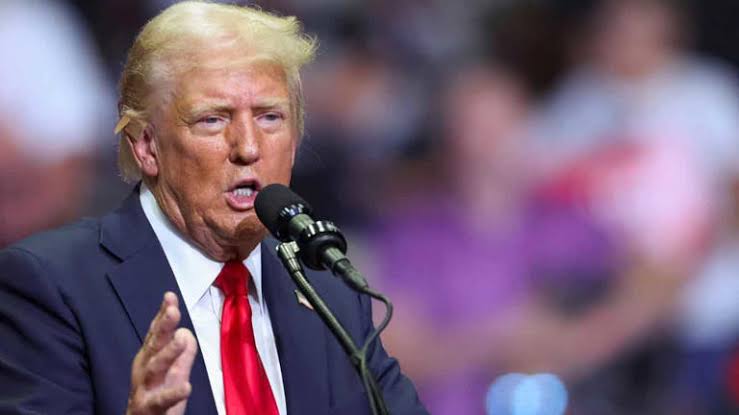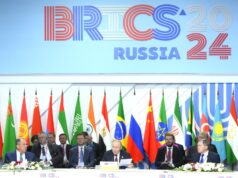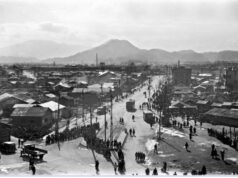Trump signals shift in US foreign policy before inauguration

By Tajul Islam
President-elect Donald Trump has yet to take the oath of office, but his foreign policy announcements are already reverberating across the globe. In his characteristic style, Trump has made bold moves, threatening tariffs on allies and adversaries alike while signaling a hardline approach to global economic and diplomatic issues.
Even before his inauguration on January 20, Trump is sending a clear message: the days of passive US leadership are over.In the past month, Trump has issued sweeping tariff threats aimed at two key North American allies, one major adversary, and a powerful Global South alliance.
Mexico and Canada, long-standing trade partners under the North American Free Trade Agreement (NAFTA), now face the prospect of a 25% tariff on imports unless they take concrete steps to curb the flow of drugs and migrants across their borders with the US
The move has rattled both countries, leading to differing reactions. Mexican officials responded with reciprocal threats but also extended an olive branch, while Canadian Prime Minister Justin Trudeau made a visit to Mar-a-Lago in an attempt to dissuade Trump from imposing the tariffs.
China, a frequent target of Trump’s economic ire, has not been spared. The president-elect has threatened a 10% tariff on Chinese imports, a move he claims will address long-standing trade imbalances and protect American industries.
While critics argue that such tariffs could provoke a trade war and raise prices for U.S. consumers, Trump views these measures as essential tools to strengthen America’s negotiating position.
Trump has also turned his attention to the BRICS bloc-Brazil, Russia, India, China, and South Africa-along with its expanded members, Egypt, Ethiopia, Iran, and the UAE. In a dramatic move, Trump threatened a 100% tariff on goods from BRICS nations if they move forward with plans to create an alternative to the US dollar for global trade.
Using his platform on Truth Social, Trump declared, “We require a commitment from these countries that they will neither create a new BRICS currency nor back any other currency to replace the mighty US dollar, or they will face 100 percent tariffs.
”Trump’s threats are more than mere posturing; they reflect his intention to draw a hard line in the sand on US global economic dominance. While experts, including the Atlantic Council and the Council on Foreign Relations, doubt the feasibility of a BRICS currency replacing the dollar, Trump’s rhetoric underscores his willingness to confront even the possibility of diminished US influence.
The US dollar remains the world’s leading reserve currency, used in 80% of global trade, and Trump aims to ensure its primacy remains unchallenged.
Trump’s strategy is rooted in his well-documented negotiating style, outlined in his book The Art of the Deal. He starts with an aggressive opening bid-often shocking allies and adversaries alike-and then uses the ensuing chaos as leverage to extract favorable terms.
This tactic, described by some as entering a room, throwing a metaphorical bomb, and returning later to negotiate, has been a hallmark of his approach to both politics and foreign policy.
Trump’s moves have implications far beyond North America and BRICS. His aggressive stance serves as a warning to European allies, signaling that the U.S. will no longer tolerate policies perceived as detrimental to American interests.
Trump’s actions suggest a return to the transactional diplomacy of his first term, where tariffs, sanctions, and threats were wielded as tools to compel compliance from allies and adversaries alike.
Rep. Michael Waltz, Trump’s newly chosen national security adviser, coined the term “the Trump effect” to describe the ripple effects of Trump’s leadership.
According to Waltz, Trump’s return to power has already prompted panic among authoritarian regimes in Venezuela, Nicaragua, and Cuba. Waltz has also credited Trump’s influence with recent de-escalations in the Middle East, including a ceasefire between Hezbollah and Israel.
“Everyone is coming to the table because of President Trump,” Waltz proclaimed, emphasizing the decisive impact of Trump’s foreign policy style.
Despite President Joe Biden still being in office, Trump is casting a long shadow over global affairs. Leaders from the Indo-Pacific to the Middle East have been reaching out to Trump’s team, signaling their anticipation of a significant shift in US foreign policy.
However, the Biden administration is uneasy with Trump’s assertive pre-inauguration actions. Critics accuse Trump of running a parallel foreign policy, undermining Biden’s efforts to solidify his legacy.
One area of contention is the ongoing conflict in Ukraine. Biden has allowed Ukraine to use long-range US missiles against Russia, escalating tensions in a way that could complicate Trump’s stated goal of brokering peace in the region.
While Biden’s administration seeks to lock in policies that could constrain Trump, Trump’s team insists on a smooth transition. Waltz emphasized in a recent interview that he has been working closely with outgoing national security adviser Jake Sullivan, assuring allies and adversaries alike that the US remains unified during the transition.
Speculation abounds about the hawkish views of Trump’s proposed foreign policy team and their potential impact on US strategy.
However, when it comes to foreign policy, there is little doubt that Trump will be the ultimate decision-maker. His leadership style leaves no room for ambiguity: he will dictate the agenda, and his team will execute it.
This approach is already evident in his pre-inauguration activities. By taking bold stances and issuing dramatic threats, Trump is signaling a new era of US foreign policy-one that prioritizes strength, leverage, and a zero-tolerance approach to challenges against American dominance.
As the world waits for Trump’s official return to the White House, his actions are already reshaping the global landscape. From trade wars with neighbors to ultimatums for global alliances, Trump is positioning himself as a leader unafraid to make waves.
For better or worse, his approach to foreign policy is setting the stage for a contentious and unpredictable term.In the coming months, Trump’s ability to navigate these complex dynamics will be tested.
His tactics may yield significant gains, but they also carry the risk of alienating allies and provoking adversaries.
As January 20 approaches, one thing is clear: Donald Trump’s foreign policy is already making its mark, and the world is taking notice.




